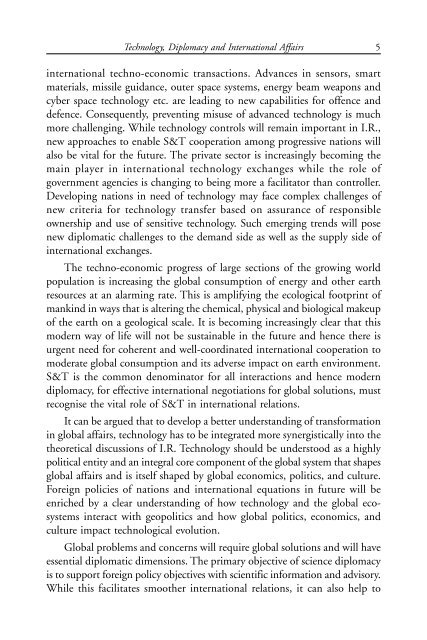ROLE OF TECHNOLOGY INTERNATIONAL AFFAIRS
book_role-of-technology-in-international-affairs_a-mallik_1
book_role-of-technology-in-international-affairs_a-mallik_1
Create successful ePaper yourself
Turn your PDF publications into a flip-book with our unique Google optimized e-Paper software.
Technology, Diplomacy and International Affairs<br />
5<br />
international techno-economic transactions. Advances in sensors, smart<br />
materials, missile guidance, outer space systems, energy beam weapons and<br />
cyber space technology etc. are leading to new capabilities for offence and<br />
defence. Consequently, preventing misuse of advanced technology is much<br />
more challenging. While technology controls will remain important in I.R.,<br />
new approaches to enable S&T cooperation among progressive nations will<br />
also be vital for the future. The private sector is increasingly becoming the<br />
main player in international technology exchanges while the role of<br />
government agencies is changing to being more a facilitator than controller.<br />
Developing nations in need of technology may face complex challenges of<br />
new criteria for technology transfer based on assurance of responsible<br />
ownership and use of sensitive technology. Such emerging trends will pose<br />
new diplomatic challenges to the demand side as well as the supply side of<br />
international exchanges.<br />
The techno-economic progress of large sections of the growing world<br />
population is increasing the global consumption of energy and other earth<br />
resources at an alarming rate. This is amplifying the ecological footprint of<br />
mankind in ways that is altering the chemical, physical and biological makeup<br />
of the earth on a geological scale. It is becoming increasingly clear that this<br />
modern way of life will not be sustainable in the future and hence there is<br />
urgent need for coherent and well-coordinated international cooperation to<br />
moderate global consumption and its adverse impact on earth environment.<br />
S&T is the common denominator for all interactions and hence modern<br />
diplomacy, for effective international negotiations for global solutions, must<br />
recognise the vital role of S&T in international relations.<br />
It can be argued that to develop a better understanding of transformation<br />
in global affairs, technology has to be integrated more synergistically into the<br />
theoretical discussions of I.R. Technology should be understood as a highly<br />
political entity and an integral core component of the global system that shapes<br />
global affairs and is itself shaped by global economics, politics, and culture.<br />
Foreign policies of nations and international equations in future will be<br />
enriched by a clear understanding of how technology and the global ecosystems<br />
interact with geopolitics and how global politics, economics, and<br />
culture impact technological evolution.<br />
Global problems and concerns will require global solutions and will have<br />
essential diplomatic dimensions. The primary objective of science diplomacy<br />
is to support foreign policy objectives with scientific information and advisory.<br />
While this facilitates smoother international relations, it can also help to


